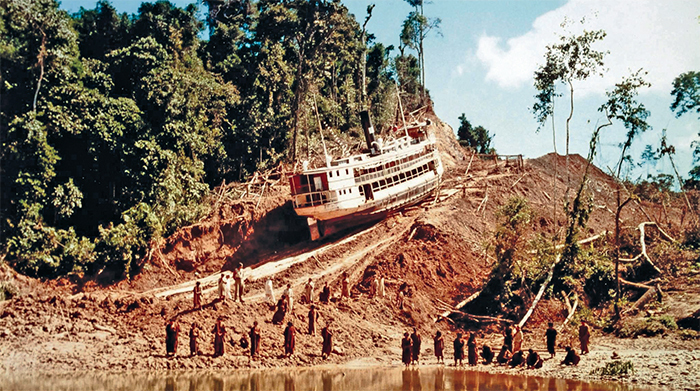
On the occasion of the publication by University of Minnesota Press of a book collecting treatments for some of Werner Herzog’s best films—such as Aguirre, the Wrath of God and Fitzcarraldo—A. S. Hamrah reflects on the filmmaker’s work for Bookforum. Hamrah marvels at Herzog’s trajectory from New German Cinema auteur to Hollywood director, and suggests that his remarkable accomplishments stand as a riposte to his own bleak pronouncements about the futility of human activity. Read an excerpt from the piece below, or the full text here.
As Herzog catalogues man’s inhumanity to man and nature, he seems to peer nonstop into the abyss—Into the Abyss, in fact, is the title of one of his recent documentaries. The last scene of Aguirre—with Kinski adrift on a raft in the Amazon, a conqueror of nothing—is the quintessential Herzog synthesis, combining vainglory, cruelty, and madness. Those are the coordinates at which Herzog geolocates humanity. In the end, he seems to say, we will alienate everyone with our mania and our crimes, and then drift into a sea of nothingness, beset by spider monkeys.
Yet Herzog’s films somehow buoy us. Their coming-into-being, the fact that he made them at all, is a challenge to the entropy they describe. If Herzog’s persona has eclipsed his filmmaking accomplishments, it is largely because we now inhabit a world in which the actual achievement of grand, worthwhile ambition seems impossible. To gently and lovingly mock him cuts him down to size. Les Blank’s 1982 documentary Burden of Dreams, in which Blank interviewed Herzog on location in Peru while Herzog was making Fitzcarraldo, is the standard-bearer for making-of docs, but it gave audiences the definitive dour, gloomy Herzog, a German in a rugby shirt, khakis, and white Adidas sneakers pronouncing on risk, death, and the indifference of the universe.
Image: From Herzog’s Fitzcarraldo (1982).